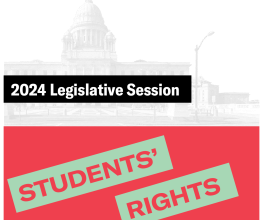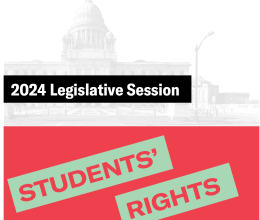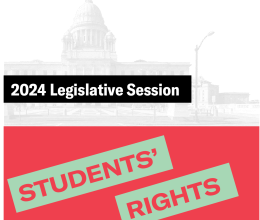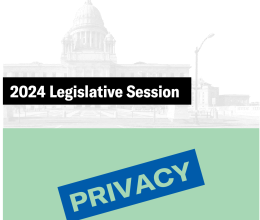Few people are aware of the devastating consequences that will follow from the Department of Education’s planned implementation in 2014 of a flawed “high stakes testing” requirement. That was the message today from community and civil rights groups which examined in thorough detail the statistics from the latest standardized test results (known as the “NECAP tests”) for Rhode Island students. Charts and graphs presented by the groups at a news conference today showed that the testing requirement will have a “stunning and severe” adverse impact on every community in the state. Among the findings the groups released today, based on the 11th Grade NECAP math scores released two weeks ago:
- Almost half of all students in the state (44%) risk not graduating under the high stakes testing requirement;
- 84% of special education students are at risk of not getting a diploma;
- 70% of all African-American and Latino students would not qualify for a diploma;
- More than two-thirds of students in most urban school districts (79% in Central Falls; 69% of Providence students; and 68% of Pawtucket students) would not get a diploma;
- In Barrington, one of the state’s wealthier communities and the town with the lowest percentage of students at risk of not getting a diploma, 13% of the students would still not qualify for a diploma based on their NECAP scores. In East Greenwich, 17% of the students would not gain a diploma;
- The Department of Education itself, though pushing high stakes testing on students, has failed to meet any of its own objectives for progress at the high school level, and met a total of only four out of 33 objectives among all grade levels.
- Even as the Department of Education demands that, in two years, every high school student pass a standardized written test to graduate, the agency has asked the federal government for six years to try to cut in half the lack of student proficiency on the state assessments;
- The progress and decline in NECAP math test scores each year since 2007 generally match those in the states of Vermont and New Hampshire, which also use the NECAP test, strongly suggesting that it is the test itself that is determining whether the students are "improving" or not.
The organizations all acknowledged the importance of high expectations for students, but argued that use of a standardized written test to determine whether students graduate was an inappropriate and irrelevant standard. The groups cited a recent study by the National Academies of Sciences, which concluded that “high school exit exam programs . . . decrease the rate of high school graduation without increasing achievement.”
The groups participating in the news conference included the Rhode Island ACLU, Rhode Island Legal Services, Rhode Island Disability Law Center, Tides Family Services, and Young Voices.
Legislation in the General Assembly sponsored by Rep. Eileen Naughton and Sen. Harold Metts would bar the DOE’s implementation of high stakes testing, and instead would require school districts to provide the necessary supports to students to help them achieve.
Read comments from the participant's in the news conference.
Additional Documents:
• Percentage of Students at Risk of Being Denied a Diploma, by District







